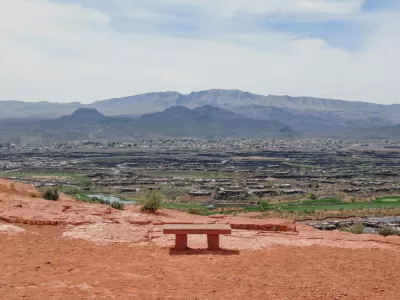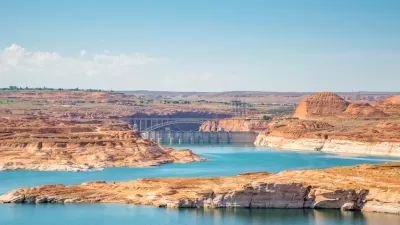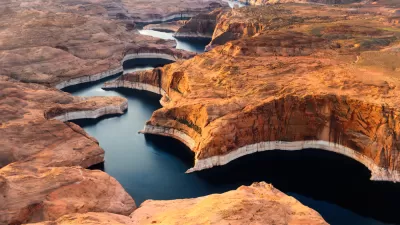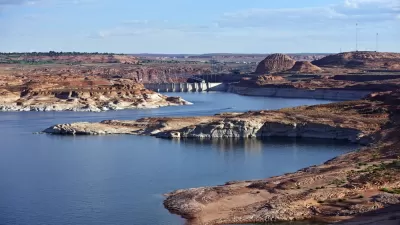The seven states of the Colorado River Compact usually stay out of each other's business once the water is divvied up, but in a surprising move, six of the compact states have signed a letter to raise concerns about Utah's pipeline plans.

Following a few months after the release of the Environmental Impact Statement for the Lake Powell Pipeline project, six of the seven states that rely on water from the Colorado River have asked federal regulators at the U.S. Department of the Interior to slow down the process.
An on-air feature, transcribed for the KJZZ site, digs into the implications of the letter sent by six states to oppose the actions of he state of Utah in seeking to build a pipeline for shipping Colorado River water to the fast growing community of St. George, Utah. Lauren Gilger and Mark Brodie host the show, speaking with John Fleck, author and director of the University of New Mexico Water Resources Program, for insight into the significance of the kerfuffle. Fleck explains:
The letter was really surprising to a lot of us and really striking because we have a tradition in the Colorado River Basin that states don't mess in other states' business — that what a state does with the water within its boundaries is that, is each state's business. And the letter, there's a kind of a remarkable breakdown of that bargain. This is six states getting together and saying, "We have a problem with what Utah is doing and the way Utah is doing it with its share of its Colorado River water."
Fleck elaborates:
Well, the problem with what Utah is doing, and in a sense, you know, we could have a blame game going on here, but essentially what the states are, are arguing is that Utah, in charging ahead with the Lake Powell Pipeline, without engaging in consultation and collaboration with the other states, is acting in a way that poses a lot of risk to the sort of seven-state collaboration that we've seen more and more over the last 20 years. There are a number of concerns that states have had for a long time about the Lake Powell Pipeline. And rather than working with the states to come up with a shared understanding of how to go forward with this pipeline, Utah has decided to just charge ahead. And the other states are saying, "Whoa, we need to put the brakes on here.
Fleck and Brodie speak at much greater length, including a discussion about the likelihood that the federal government might heed the warnings of the six other states.
The Kaibab Band of Paiute Indians raised alarms about the pipeline project in June, when the U.S. Bureau of Reclamation released the environmental impact statement for the proposed pipeline. Planetizen has been tracking the Lake Powell Pipeline Project since March 2018.
FULL STORY: 'Really Surprising And Really Striking' — 6 Colorado River Basin States Tell Feds To Slow Down Utah Project

Study: Maui’s Plan to Convert Vacation Rentals to Long-Term Housing Could Cause Nearly $1 Billion Economic Loss
The plan would reduce visitor accommodation by 25,% resulting in 1,900 jobs lost.

North Texas Transit Leaders Tout Benefits of TOD for Growing Region
At a summit focused on transit-oriented development, policymakers discussed how North Texas’ expanded light rail system can serve as a tool for economic growth.

Why Should We Subsidize Public Transportation?
Many public transit agencies face financial stress due to rising costs, declining fare revenue, and declining subsidies. Transit advocates must provide a strong business case for increasing public transit funding.

A Visual Celebration of Manhattan’s Chinatown Elder Community, Through Food
Lanterns, cafeteria trays, and community connection take center stage in this stunning photo essay.

How to Make US Trains Faster
Changes to boarding platforms and a switch to electric trains could improve U.S. passenger rail service without the added cost of high-speed rail.

Columbia’s Revitalized ‘Loop’ Is a Hub for Local Entrepreneurs
A focus on small businesses is helping a commercial corridor in Columbia, Missouri thrive.
Urban Design for Planners 1: Software Tools
This six-course series explores essential urban design concepts using open source software and equips planners with the tools they need to participate fully in the urban design process.
Planning for Universal Design
Learn the tools for implementing Universal Design in planning regulations.
City of Santa Clarita
Ascent Environmental
Institute for Housing and Urban Development Studies (IHS)
City of Grandview
Harvard GSD Executive Education
Toledo-Lucas County Plan Commissions
Salt Lake City
NYU Wagner Graduate School of Public Service





























